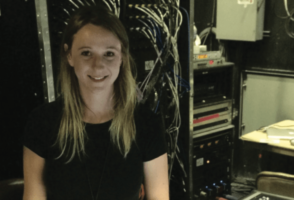
Next generation of live sound: Anne-Lise Coulet, monitors engineer
PSNEurope casts a spotlight on those breaking into the live sound sector, kicking off with monitors engineer Anne-Lise Coulet.
Over the course of the festival season, PSNEurope has had its sights set firmly on the future. The speed at which audio technology is evolving has resulted in a constant stream of stories throughout the summer months on the seemingly infinite potential of immersive sound, experimental techniques in the recording studio and tactical acquisitions preparing businesses to adapt and become more flexible in the decades to come. This proves that now, perhaps more than ever, is a truly exciting time to be involved in this industry, as audio and AV tech is being driven by world- leading innovation.
This open-minded approach is testament to the people working within the industry, who make it such a great and competitive market to work in. In the festival season, the live sector of the audio industry really comes into its own, as festivals, outdoor gigs and theatre events bring audiences together to hear their favourite music or their best-loved Shakespeare verses in an outdoor arena.
Over the past few month, we’ve been speaking to the next generation of live audio professionals shaping the direction of the industry about what the sector looks like in 2018 and the changes they’d like to see going forward, starting with monitors engineer Anne-Lise Coulet…
How did you get into this industry?
Back when I was in college in France, I was really into music. I volunteered at a music festival on my campus and I ended up helping out on stage. When I saw the monitor engineer mixing, I thought to myself, ‘that’s it!’
Can you name some of your influences within the industry?
So many people have influenced and inspired me in my career but the three major ones are French mixers who I worked with when I first started in the audio industry: Yves Jaget, Sebastien Rouget, and Stephane Kijek. To this day, I still use all their tricks.
What’s the worst advice you’ve ever heard?
Several voices are resonating in my head right now. When I first decided to get into the audio industry, people told me that you have to be born into it or you have to be a musician to understand. I was raised on a farm in Eastern France and I discovered Led Zeppelin when I was 16 years old. People trying to tell me that I didn’t come from the right place or have the right background is something I’ve dealt with quite a lot throughout my career, and I’m glad I didn’t listen to any of the bad advice. Six years ago, when I decided to make the big move from Paris to Los Angeles, people said things like, ‘You know that working in the US as an audio engineer is impossible, right? You should consider a plan B’.
And the best tips you’ve been given?
Do not consider a plan B and go ahead! Learn to work on every console and make sure you understand RF. One of my best friends, Emmanuelle Pedron, is a very talented and respected lighting designer in the industry. She used to tell me to take every gig that you are o ered. Experience is definitely the best teacher.
What’s your favourite thing about the industry you work in?
In the live audio industry you can dream big, because anything is possible. You can receive a call one day and the next thing you know you are on a flight to Japan to mix monitors for an A-list artist. You get to travel the world and discover new cultures and new ways of working all the time.
What are the biggest challenges of the job?
Staying up to date with the new technology;d it changes very fast. Also, to stay open minded. Every artist is di erent, as well as their IEM mix. You have to listen closely to what they want, to be able to read body language and work with unspoken cues from the artist who’s in the midst of an intense performance.
What other interests do you have outside the world of audio?
I love languages, yoga, and reading. I also love to travel and discover new cultures.
What advice would you give to someone else – your best tip or trick?
Work hard, be attentive, focused and humble. Be curious about how other audio engineers approach their mixes, ask questions. Repeat. All the live audio mixers are coming from di erent horizons, most of the time self- taught. Every engineer who I’ve worked with has helped develop my technique.
Where would you like to be in 10 years?
I can see myself mixing TV shows, monitors or FOH. I’ve recently tried to get more into Pro Tools. I’m hoping this could fit somewhere in the picture also. Or maybe teaching others all that I’ve experienced on the road.
linkedin.com/in/anne-lise-coulet-8a529770
Source: mi-pro.co.uk












